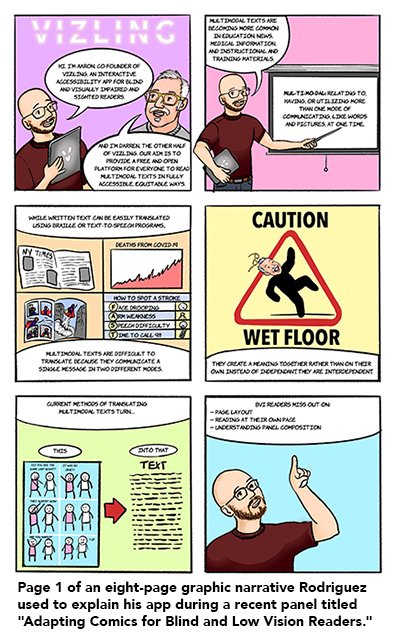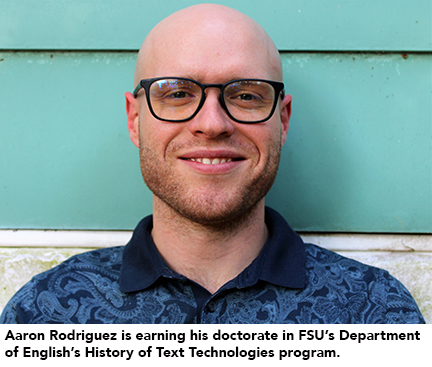NEH awards doctoral student Aaron Rodriguez grant to develop app for reading accessibility
The National Endowment of the Humanities awarded a Florida State University English doctoral candidate a $99,915 Digital Humanities Advancement Grant to develop and release a beta-level app to improve accessibility of graphic and visual narratives for blind and low-visioned readers.
Aaron Rodriguez, who is earning his degree in FSU’s History of Text Technologies Program, is collaborating with Wichita State University Professor of English Darren DeFrain on the project, and they share the grant. The two will continue work on the Vizling App that was initiated when Rodriguez was a master’s student at Wichita State.
“When I started teaching, I had a student who had a macular hole and she was struggling to read comics in my class, and all the translation technology didn't really work,” Rodriguez says. “She could still generally see what was happening on the page, but she couldn't focus on the words and the speech bubbles. She could generally understand what was going on, so this app would work well for her.”
 The app offers a touch-screen option for the blind and visually impaired to explore comics in three ways: global narrative, or audiobook; narrative-grammar, or panel-to-panel reading, and free exploration mode. In a short video tutorial, Rodriguez showed how the audio descriptions of the page content are activated by dragging a finger across the screen and stopping on a panel, a speech bubble, or an object on the page.
The app offers a touch-screen option for the blind and visually impaired to explore comics in three ways: global narrative, or audiobook; narrative-grammar, or panel-to-panel reading, and free exploration mode. In a short video tutorial, Rodriguez showed how the audio descriptions of the page content are activated by dragging a finger across the screen and stopping on a panel, a speech bubble, or an object on the page.
The NEH awarded 20 Digital Humanities Advancement Grants, totaling $2.3 million. The funds, according to the NEH, support the implementation of innovative digital humanities projects that have successfully completed a start-up phase and demonstrated their value to the field.
Rodriguez says that while Vizling’s target audience is teachers, individuals can use the app as well. He points out that this technology is crucial as higher education institutions continue to comply with the Americans with Disabilities Act. He adds that he and DeFrain are considering ways to make the app’s functions more universal.
“We're using Vizling for comics, but we could conceivably embed this in Canvas, and then any instructor could take a multi-modal image and make that accessible,” he says. “Thinking about a biology textbook, and if you're explaining mitosis, the image has a lot more meaning than the corresponding text. We could translate that to a way that is more accessible, not necessarily visual, but emphasizing the spatial nature of how the information is organized on the page.”
Rodriguez and DeFrain first applied for this grant in 2020, but they were denied. In general, the grant evaluators offered constructive criticism, although one commenter did question the value of comics in the humanities.
“That was frustrating to me,” says Rodriguez, who enrolled in a grant writing class with FSU Adjunct Professor Christie Koontz in the College of Communication & Information to learn how to improve the proposal. “The class was really helpful, and as I was taking it, I realized where we messed up, and I thought, ‘No wonder they didn't give it to us.’”
Rodriguez and DeFrain reapplied in January 2021 and learned the news in early August. The grant director called directly to congratulate them, and she specifically pointed out how much growth the second application showed from the first.
Krafft Professor of English Anne Coldiron is co-directing Rodriguez’ doctoral dissertation, which specializes in text technologies. She says his success is not surprising to her.
“His work has a lot of qualities that the wider world needs,” says Coldiron. “Aaron has excelled in my History of Text Technologies graduate seminars. His work interrogates the importance not just of media in literature, but of entire systems of textual production, distribution, and reception through which literary cultures are created.”
 His studies in Coldiron’s seminars have stretched from ancient inscriptions on stone to contemporary XML. He also has worked on medieval manuscripts and early modern incunables, or early printed books.
His studies in Coldiron’s seminars have stretched from ancient inscriptions on stone to contemporary XML. He also has worked on medieval manuscripts and early modern incunables, or early printed books.
“He always historicizes and yet is transhistorical: he is attuned to historical contexts but thinks and works across period lines,” Coldiron says. “He has great digital chops and creativity, as the NEH project shows. He genuinely wants to learn and to contribute: this is not just about checking credential-boxes for him.”
Rodriguez, in turn, says Coldiron is “a brilliant professor,” adding that taking classes with her should be a requirement for all graduate students.
“She had such high standards, but at the end of the semester, you just come out knowing so much more than you could ever realize really,” he says. “She is really good at giving me confidence to accomplish goals that I might not think I’m capable of doing.”
Robert O. Lawton Professor of English Gary Taylor is Rodriguez’ second dissertation director. Rodriguez says he chose FSU for his Ph.D. program because of Taylor’s expertise in History of Text Technologies. Taylor also is known worldwide for his work on Shakespeare and his contemporaries.
“For my doctoral preliminaries and my dissertation, he’s helped me figure how we can make Vizling, which has nothing to do with Shakespeare, have uses for Shakespeare productions,” Rodriguez says. “I’m now interested in how I can apply this app to theater, which I never thought about before. Both page layouts and stage layouts are static, so if you’re visually impaired, you’re not going to be able to see. But that spatial layout is important for the viewer of the play.”
Rodriguez also appreciates that English professors Leigh Edwards, Barry Faulk, Michael Neal, Tarez Samra Graban, and John Ribó all allowed him to write comics technology papers in their classes.
“I know they were probably really bad, but they were OK with it, and so those papers represent the more theoretical ideas for Vizling in its embryonic stage,” he says. “Without them encouraging me, I probably would have dropped this project and not continued with it.”
Read more about Rodriguez and Vizling in English major Tabitha Labrato's article here.
Follow the English department on Instagram @fsuenglish; on Facebook facebook.com/fsuenglishdepartment/; and Twitter, @fsu_englishdept

